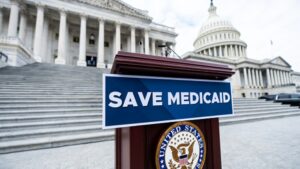Understanding the Impact of Recent Changes to Medicaid and SNAP
At Extreme Investor Network, it’s essential to stay informed about changes in personal finance that could affect you and your community. The recent budget package passed by the House of Representatives has significant implications for Medicaid and SNAP, two crucial programs for millions of Americans. Here’s a detailed look at what’s changing and how it may impact your financial landscape.
Historic Spending Cuts: What’s at Stake?
The budget package, known as the "One Big Beautiful Bill Act," proposes to slash Medicaid spending by approximately $700 billion and SNAP by around $300 billion—the largest reductions in the history of these programs. As these bills move to the Senate, it is vital to consider who stands to lose and what this means for financial planning.
Jennifer Wagner, a leading expert at the Center on Budget and Policy Priorities, emphasizes that these cuts will affect individuals entitled to these benefits. Whether you or someone you know relies on these programs, it’s crucial to be aware of the changes ahead.
An Unprecedented Increase in Debt
Experts estimate that the reconciliation bill will add nearly $3 trillion to the national debt over the next decade, predominantly to finance tax perks for wealthier citizens. With Medicaid and SNAP under the knife, everyday Americans may bear the brunt of these fiscal decisions. As you consider your financial future, it’s important to think about how government fiscal policies can influence your personal economic stability.
New Medicaid Work Requirements
One of the most contentious aspects of the House proposal is the introduction of new work requirements for Medicaid recipients. Starting no later than December 31, 2026, individuals covered under the Affordable Care Act’s expansion will need to demonstrate engagement in qualifying activities for at least 80 hours a month, unless granted an exemption.
Wagner notes that the accelerated timeline limits public input, which could lead to significant hardships for many individuals who rely on these benefits for their health care needs. This could hinder access to necessary medical treatments, affecting the very foundation of financial and physical well-being.
Increasing Frequency of Eligibility Redeterminations
In an additional effort to tighten Medicaid eligibility, states will be required to conduct more frequent eligibility redeterminations for adults. Starting December 31, 2026, these checks will occur every six months, compared to the current annual reviews. Such frequent evaluations can be overwhelming and stressful for beneficiaries who rely on stable health coverage.
Expanding SNAP Work Requirements
The proposed changes to SNAP could also strip food assistance from millions. The House bill aims to expand work requirements to those aged 55-64 and families with children over six years old, tightening the already stringent eligibility criteria.
State flexibility to grant waivers for the work requirements will diminish, which could lead to greater food insecurity in households already struggling to make ends meet. With these cuts, budgeting for food will become an ever more pressing concern for families across the nation.
What Can You Do?
-
Stay Informed: Regularly check credible sources for updates on these legislative changes. Understanding the law’s nuances is crucial for personal financial planning.
-
Advocate: Engaging with local representatives about the potential impacts of these cuts can amplify your voice and advocate for needed support.
- Plan Ahead: If you are currently using Medicaid or SNAP, consider your options and start creating a financial emergency plan. Make sure you have a safety net in place to handle any changes that may arise.
Conclusion
As the financial landscape continues to evolve, especially with government policies affecting essential services like Medicaid and SNAP, it is imperative to be proactive and prepared. At Extreme Investor Network, we encourage our readers to stay abreast of these changes and understand their implications on personal finance. By being informed and engaged, you can better navigate the financial challenges ahead.
Your financial future hinges not just on your choices, but also on the collective decisions being made at the policy level. Let’s face these changes together and ensure that you, your family, and your community remain financially resilient.

